The Jordan Portal  Jordan, officially the Hashemite Kingdom of Jordan, is a country in the Southern Levant region of West Asia. Jordan is bordered by Syria to the north, Iraq to the east, Saudi Arabia to the south, and Israel and the occupied Palestinian West Bank to the west. The Jordan River, flowing into the Dead Sea, is located along the country's western border. Jordan has a small coastline along the Red Sea in its southwest, separated by the Gulf of Aqaba from Egypt. Amman is Jordan's capital and largest city, as well as the most populous city in the Levant. Modern-day Jordan has been inhabited by humans since the Paleolithic period. Three kingdoms emerged in Transjordan at the end of the Bronze Age: Ammon, Moab and Edom. In the third century BC, the Arab Nabataeans established their kingdom centered in Petra. Later rulers of the Transjordan region include the Assyrian, Babylonian, Roman, Byzantine, Rashidun, Umayyad, Abbasid, and the Ottoman empires. After the Great Arab Revolt against the Ottomans in 1916 during World War I, the Greater Syria region was partitioned by Britain and France. The Emirate of Transjordan was established in 1921 by the Hashemite, then Emir, Abdullah I, and the emirate became a British protectorate. In 1946, Jordan gained independence and became officially known as the Hashemite Kingdom of Jordan. The country captured and annexed the West Bank during the 1948 Arab–Israeli War until it was occupied by Israel in 1967. Jordan renounced its claim to the territory to the Palestinians in 1988, and signed a peace treaty with Israel in 1994. Jordan is a semi-arid country, covering an area of 89,342 km2 (34,495 sq mi), with a population of 11.5 million, making it the eleventh-most populous Arab country. The dominant majority, or around 95% of the country's population, is Sunni Muslim, with the rest being mostly Arab Christian. Jordan was mostly unscathed by the violence that swept the region following the Arab Spring in 2010. From as early as 1948, Jordan has accepted refugees from multiple neighbouring countries in conflict. An estimated 2.1 million Palestinian refugees, most of whom hold Jordanian citizenship, as well as 1.4 million Syrian refugees, were residing in Jordan as of 2015. The kingdom is also a refuge for thousands of Christian Iraqis fleeing persecution. While Jordan continues to accept refugees, the large Syrian influx during the 2010s has placed substantial strain on national resources and infrastructure. The sovereign state is a constitutional monarchy, but the king holds wide executive and legislative powers. Jordan is a founding member of the Arab League and the Organisation of Islamic Co-operation. The country has a high Human Development Index, ranking 99th, and is considered a lower middle income economy. The Jordanian economy, one of the smallest economies in the region, is attractive to foreign investors based upon a skilled workforce. The country is a major tourist destination, also attracting medical tourism due to its well developed health sector. Nonetheless, a lack of natural resources, large flow of refugees, and regional turmoil have hampered economic growth. (Full article...) Selected article - Water supply and sanitation in Jordan is characterized by severe water scarcity, which has been exacerbated by forced immigration as a result of the 1948 Arab–Israeli War, the Six-Day War in 1967, the Gulf War of 1990, the Iraq War of 2003 and the Syrian Civil War since 2011. Jordan is considered one of the ten most water scarce countries in the world. High population growth, the depletion of groundwater reserves and the impacts of climate change are likely to aggravate the situation in the future. The country's major surface water resources, the Jordan River and the Yarmouk River, are shared with Israel and Syria who leave only a small amount for Jordan. The Disi Water Conveyance Project from the non-renewable Disi aquifer to the capital Amman, opened in July 2013, increases available resources by about 12%. It is planned to bridge the remaining gap between demand and supply through increased use of reclaimed water and desalinated sea water to be provided through the Red Sea-Dead Sea canal. (Full article...)Selected biography -Abdullah I bin Al-Hussein (Arabic: عبد الله الأول بن الحسين, romanized: ʿAbd Allāh al-Awwal bin al-Ḥusayn, 2 February 1882 – 20 July 1951) was the ruler of Jordan from 11 April 1921 until his assassination in 1951. He was the Emir of Transjordan, a British protectorate, until 25 May 1946, after which he was king of an independent Jordan. As a member of the Hashemite dynasty, the royal family of Jordan since 1921, Abdullah was a 38th-generation direct descendant of Muhammad. Born in Mecca, Hejaz, Ottoman Empire, Abdullah was the second of four sons of Hussein bin Ali, Sharif of Mecca, and his first wife, Abdiyya bint Abdullah. He was educated in Istanbul and Hejaz. From 1909 to 1914, Abdullah sat in the Ottoman legislature, as deputy for Mecca, but allied with Britain during the First World War. During the war, he played a key role in secret negotiations with the United Kingdom that led to the Great Arab Revolt against Ottoman rule that was led by his father Sharif Hussein. Abdullah personally led guerrilla raids on garrisons. (Full article...)WikiProjectFor editor resources and to collaborate with other editors on improving Wikipedia's Jordan-related articles, see WikiProject Jordan. General images -The following are images from various Jordan-related articles on Wikipedia.
Selected city -
Russeifa (Arabic: الرصيفة, also spelled Ruseifa(h), Rusaifa(h), Russiefa, etc., also with peceding article el-, al-, er- or ar-) is a city in Zarqa Governorate in Jordan. It had a population of 472,604 inhabitants in 2015, making it the fourth-largest city in Jordan, after Amman, Irbid, and Zarqa. (Full article...)
See also: List of cities in Jordan
Related portalsReligions in Jordan Arab states Other countries Recognized contentFeatured articlesGood articles
TopicsSelected topic overview -
CategoriesSelected picture - Credit: Daniel Case Wadi Rum's resemblance to the surface of Mars has made it a popular filming and tourist attraction
Associated WikimediaThe following Wikimedia Foundation sister projects provide more on this subject:
SourcesDiscover Wikipedia using portals
Purge server cache |
How Can We Help?














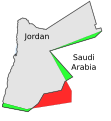




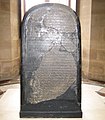










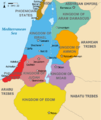
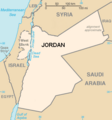



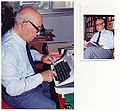































Recent Comments